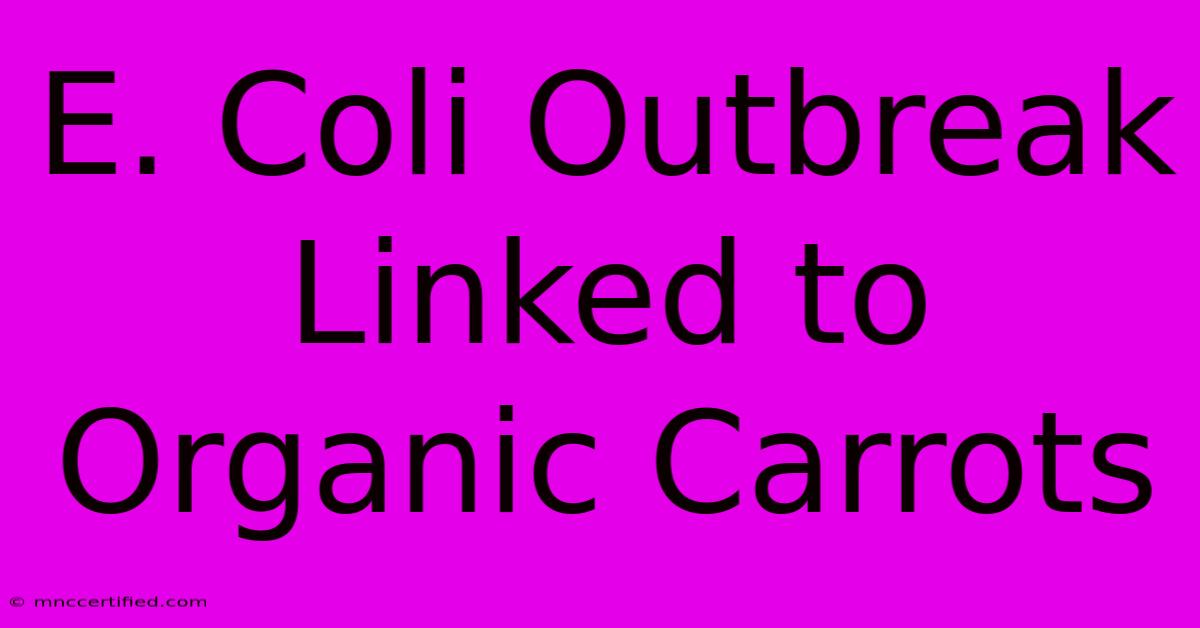E. Coli Outbreak Linked To Organic Carrots

Table of Contents
E. Coli Outbreak Linked to Organic Carrots: A Comprehensive Guide
An E. coli outbreak linked to organic carrots serves as a stark reminder of the potential dangers lurking even in seemingly healthy foods. This article will delve into the specifics of such outbreaks, exploring the causes, symptoms, preventative measures, and the ongoing debate surrounding organic produce safety.
Understanding E. coli and its Sources
Escherichia coli (E. coli) bacteria are a large and diverse group, with most strains harmless and even beneficial to human gut health. However, some strains, like E. coli O157:H7, are pathogenic, causing severe foodborne illness. These harmful strains can contaminate various foods, including fresh produce like carrots.
How E. coli Contaminate Carrots
Contamination often occurs through fecal matter. This can happen at various points in the carrot's journey from farm to table:
- During cultivation: Runoff from fields containing animal manure can contaminate the soil and subsequently the carrots.
- During harvesting and processing: Improper handling and washing techniques can spread E. coli from contaminated equipment or workers' hands.
- During transportation and storage: Inadequate refrigeration or cross-contamination during transport can contribute to bacterial growth.
The Organic Carrot Connection: Addressing Misconceptions
The association of E. coli outbreaks with organic carrots sometimes leads to misconceptions. It's crucial to understand that organic farming practices do not inherently eliminate the risk of bacterial contamination. While organic farming aims to minimize the use of synthetic pesticides and fertilizers, it does not guarantee pathogen-free produce. The risk of contamination stems from the same sources regardless of farming method – the environment and handling practices.
The Role of Soil and Water
Soil and water are significant pathways for E. coli contamination. Even in organic farming, contamination can occur through various means such as untreated irrigation water or animal waste. Strict adherence to good agricultural practices (GAPs) is critical, regardless of whether the produce is organic or conventionally grown.
Symptoms of E. coli Infection
Symptoms of E. coli infection can range from mild to severe. They typically appear within 2 to 10 days after consuming contaminated food and may include:
- Diarrhea (often bloody): This is a hallmark symptom of E. coli infection.
- Stomach cramps
- Nausea and vomiting
- Fever
- Fatigue
In severe cases, E. coli infection can lead to hemolytic uremic syndrome (HUS), a life-threatening condition affecting the kidneys. Seek immediate medical attention if you experience severe symptoms.
Preventing E. coli Contamination: A Multifaceted Approach
Preventing E. coli contamination requires a multi-faceted approach involving farmers, processors, retailers, and consumers:
- Good Agricultural Practices (GAPs): Implementing strict GAPs on farms is crucial. This includes proper sanitation, manure management, and irrigation practices.
- Thorough Washing: Washing carrots thoroughly under running water before consumption is essential. Scrubbing with a brush can help remove surface contaminants.
- Safe Food Handling: Maintaining hygiene during food preparation is critical. Wash hands thoroughly before and after handling food.
- Proper Storage: Refrigerate carrots promptly to slow bacterial growth.
The Ongoing Debate: Organic vs. Conventional
The question of whether organic or conventionally grown produce poses a greater risk of E. coli contamination remains complex. While some studies suggest potential differences, the evidence is inconclusive. The most effective approach lies in prioritizing safe farming practices and careful food handling, regardless of farming method.
Conclusion: Prioritizing Food Safety
Outbreaks linked to organic carrots highlight the importance of prioritizing food safety at all stages of the food production chain. By understanding the sources of contamination, implementing appropriate preventative measures, and educating consumers, we can minimize the risk of E. coli infections and ensure the safety of our food supply. Remember that diligent washing and safe food handling are crucial steps in mitigating the risk, regardless of the farming method employed.

Thank you for visiting our website wich cover about E. Coli Outbreak Linked To Organic Carrots. We hope the information provided has been useful to you. Feel free to contact us if you have any questions or need further assistance. See you next time and dont miss to bookmark.
Featured Posts
-
Lawrence In Bodycon Maternity Gown 2024
Nov 19, 2024
-
Insurance Agent Biography Samples
Nov 19, 2024
-
Carsleys Innovation Tuchels Response
Nov 19, 2024
-
Moodys Insurance Company Ratings
Nov 19, 2024
-
Positive News Boosts Super Micro Stock
Nov 19, 2024